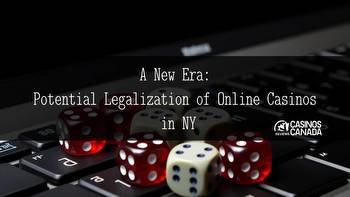New Jersey vs Pennsylvania: A Comprehensive Analysis of Gambling Markets
The United States, known for its diverse landscapes and cultures, is also a patchwork of varying gambling regulations and markets. Two states that stand out prominently in the gambling landscape are New Jersey and Pennsylvania. Both have embraced legalized gambling, but the extent and nature of their markets differ.
In this article, we’ll explore the history that has shaped New Jersey and Pennsylvanis’s gambling markets in an attempt to answer the question: which state has the largest gambling market today?
Historical Overview: Foundations of Gambling in Each State
New Jersey: The Pioneer of Legalized Gambling
Since the 1800s, New Jersey and gambling have been closely linked. Yet, it was not until the later part of the 1900s that the state took a big step. They said yes to casinos in Atlantic City. In 1978, Resorts Casino Hotel began welcoming guests. This was the first legal casino outside of Nevada. The idea was to give Atlantic City a financial boost. They wanted to draw in tourists and boost the state’s economy.
Pennsylvania: A Modern Approach to Gambling
Pennsylvania, on the other hand, took a more gradual approach to legalized gambling. While horse racing and the state lottery were established earlier, significant expansion occurred in the 21st century. The Pennsylvania Race Horse Development and Gaming Act of 2004 paved the way for the introduction of slot machines, and later, table games. The first casino, Mohegan Sun at Pocono Downs, opened in 2006, ushering in a new era of gambling in the state.
Comparing Casino Landscapes: Atlantic City vs Pennsylvania Casinos
New Jersey: Atlantic City’s Rise and Challenges
Atlantic City, with its iconic boardwalk and seaside allure, became synonymous with East Coast gambling. In its heyday, it boasted a monopoly on casino gambling in the region. However, the landscape has changed. The city faced challenges in the form of increased competition from neighboring states and the economic downturn. Yet, recent efforts at revitalization and the introduction of online gambling have injected new life into Atlantic City’s gambling scene.
Pennsylvania: Diversification and Expansion
Pennsylvania, on the other hand, embraced a more diversified approach. The state quickly became a powerhouse in the casino industry, surpassing New Jersey in terms of the number of casinos. The introduction of legislation in 2017 allowed for the legalization of online gambling, sports betting, and the construction of satellite casinos. This diversification has contributed to a robust and dynamic gambling market in Pennsylvania.
Online Gambling: A Digital Frontier
New Jersey: Pioneering Online Gambling
New Jersey was a trailblazer in the realm of online gambling. In 2013, the state legalized online casino games and poker, expanding the gambling market beyond the confines of physical casinos. The decision was strategic, aiming to capture a growing demographic that prefers the convenience of gambling from home. Online sports betting was later added to the repertoire, solidifying New Jersey’s position as a digital gambling pioneer.
Pennsylvania: Following the Digital Trend
Pennsylvania, recognizing the potential of online gambling, followed suit. The state legalized online casinos, poker, and sports betting in 2017, and saw massive growth in the market after that. Once online betting was legal, a number of sites became available for enthusiastic bettors to choose from, with Lindsey Jones noting that with so many options, it can sometimes be difficult to find the best sites (source: https://www.sportstalkphilly.com/pa/casinos). The online gambling market in Pennsylvania has experienced steady growth over the years, mirroring the national trend of an increasing preference for digital platforms.
Revenue and Economic Impact
New Jersey: A Revenue Generator
The gambling industry in New Jersey has been a noteworthy contributor to the state’s income. In the 2023 financial year, New Jersey’s casinos created over $5.8 billion in gross gaming revenue, demonstrating a noteworthy expansion from past years. This income upholds the state’s budget and additionally plays a basic part in subsidizing vital projects, for example, senior residents’ efforts, and scholastic adventures. While the gambling industry has generated significant revenue for the state, supporting many important programs, it also faces potential risks. Even a small dip in gambling revenue could impact funding for senior citizens and education. The state will need to monitor this sector closely to ensure its continued financial contributions.
Pennsylvania: A Major Player in Revenue Generation
Pennsylvania, with its diverse gambling offerings, has emerged as a major player in revenue generation. In the 2023 fiscal year, the state’s overall gambling revenue reached an impressive $5.7 billion, showcasing sustained growth and economic impact. This substantial revenue is earmarked for critical initiatives, including property tax relief, bolstering economic development projects, and contributing to the state’s General Fund. The multifaceted contributions of the gambling industry in Pennsylvania highlight its integral role in shaping the financial landscape and supporting key areas vital for the state’s prosperity.
Sports Betting: A Growing Phenomenon
New Jersey: A Leader in Sports Betting
New Jersey has been a leader in the expanding legal sports betting industry across America. Following the 2018 legislation allowing sports wagering, the state regularly places within the highest nationwide for total bets and financial income generated from sports betting. The ease of online sports gambling has served as a critical factor in its achievement. While New Jersey continues to see high participation numbers, other nearby states are taking notice and pursuing similar endeavors.
Pennsylvania: Embracing the Sports Betting Wave
Pennsylvania, recognizing the popularity of sports betting, legalized it in 2018. The state quickly became a significant player in the market. The introduction of mobile sports betting apps has further fueled the growth, making it convenient for residents and visitors to place bets on their favorite sports.
Deciding which state has the largest gambling industry involves weighing several considerations, like total earnings, variety of games, and rules around betting. Though New Jersey’s trailblazing work in internet gambling and large sums made in Atlantic City give it a strong standing, Pennsylvania’s many casinos and balanced mix contribute to its position as a core gambling center. Ultimately, examining the two underscores gaming’s evolving character in these places, as both New Jersey and Pennsylvania play essential parts in molding America’s gambling scene.







.jpg)























